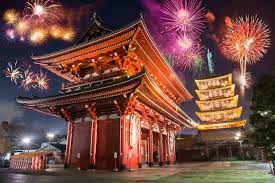Understanding Lunar New Year and Japan’s Stance
Japan, a nation steeped in a rich tapestry of traditions and customs, has a complex relationship with Lunar New Year. This Asian superpower, known for its cultural singularity, has a unique take on this widely-celebrated holiday, influenced by a confluence of historical, cultural, and contemporary factors. This article delves into how the Lunar New Year is viewed and experienced in Japan.
The Lunar New Year and its Absence in Japan
The Lunar New Year, or “Chunjie” as it’s known in Mandarin, is a monumental celebration in several Asian countries such as China, Vietnam, and Korea. It’s a time of family reunion, exchanging gifts, feasting on special meals, and honoring ancestors. However, it might surprise some to learn that in Japan, this holiday barely registers a blip on the calendar.
Japan’s Historical Shift to Gregorian Calendar
The reason behind this lies in Japan’s historical decision to adopt the Gregorian calendar in 1873, during the Meiji Restoration. Prior to this, Japan followed the lunar calendar, as was prevalent across Asia. The shift to the solar calendar, which is in line with most Western nations, was part of a broader effort to modernize and internationalize the country. This move effectively disconnected Japan from the traditional Lunar New Year celebrations.
Echoes of Lunar New Year in Japanese Traditions
Yet, even with this detachment, the Lunar New Year is not entirely alien to Japan. It echoes in the Japanese cultural fabric in the form of traditions that are still observed today, albeit on different dates. For example, the Japanese New Year, known as “Shogatsu”, shares similarities with Lunar New Year customs in terms of family gatherings, special food, and visiting shrines or temples. The primary distinction, however, is that Shogatsu is celebrated from January 1st to 3rd, according to the Gregorian calendar.
Influence of Globalization and Cultural Exchange
As globalization and cultural exchange have increased, there is now a greater awareness of Lunar New Year in Japan, particularly in major cities. This is primarily due to the influx of tourists from countries that celebrate Lunar New Year, such as China, who visit Japan during this time. Japanese businesses and media take note of this surge, often crafting special promotions or content to cater to these tourists, which indirectly raises the holiday’s profile among the Japanese public.
Japan’s Unique Cultural Preservation
Yet, despite these influences, the majority of Japanese people remain unfamiliar with Lunar New Year, and it is not widely celebrated within the country. Instead, Japan continues to uphold its unique blend of tradition and modernity, steadfastly observing its own New Year celebration. Japan’s perspective towards the Lunar New Year offers a fascinating glimpse into how cultures can selectively integrate global customs while preserving their own unique traditions.
Deep Dive into Japan’s Historical Context
To learn more about why Japan does not celebrate Lunar New Year and the historical context behind this, you can refer to this article.
Conclusion: Interconnectivity of Traditions and Celebrations
In conclusion, while Lunar New Year doesn’t feature prominently in Japan’s cultural calendar, its subtle presence serves as a testament to the global interconnectivity of traditions and celebrations. It’s a vivid reminder that even as cultures evolve and calendars change, the core values of family, renewal, and gratitude that underscore these celebrations remain a common thread uniting people across borders.
Author Bio:
I am a passionate blogger. I love to share my thoughts and ideas through blog posting. Antonio Smith has five years of experience in Tech, Business, & Health. I am associated with myhealthadvices.com, thedentaladvice.com, gossiplyf.com, thepropertybulletin.com, tourismandtravelguide.com, followmyfashion.com, mycurvyfashion.com, letstravelearth.com, timestodaymagazine.com, newstimesmagazine.com.



